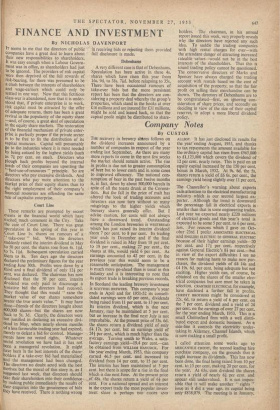Company Notes
By CUSTOS THE recovery in brewery shtres follows on the dividend increases announced by a number of companies in respect of the year ending last September. As there are many more reports to come in the next few weeks the market should remain active. The rise in profits is due not to greater consumption of beer but to lower costs and in some cases to improved efficiency. The national con- sumption of beer in the past twelve months is, in fact, down by about 500,000 barrels in spite of all the toasts drunk at the Corona- tion. But the fall in the price of malt has altered the look of trading accounts and investors can now turn without so many misgivings to the higher yields which brewery shares generally offer. But I advise caution, for costs will not always have a downward trend. Outstanding among the London breweries is WHITBREAD which has just raised its interim dividend from 7 per cent. to 8 per cent. Its trading year ends in December and if the final dividend is raised in May from 18 per cent. to 19 per cent., making 27 per cent., the shares at 88s, would yield 6 per cent. As earnings amounted to 42 per cent. in the previous year this would seem to be a reasonable anticipation. The management is much more go-ahead than is usual in this industry and it is interesting to note that its export trade is breaking previous records.
In Scotland the leading brewery investment is SCOTTISH BREWERS. This company's year ends in April and for 1951-52 its consoli- dated earnings were 65 per cent., dividends being raised from 11 per cent. to 13 per cent. Its interim dividend, which is due next January, may be maintained at 5 per cent. but an increase in the final next July is not improbable. At the present price of 53s. 6d. the shares return a dividend yield of only £4 17s. per cent. but an earnings yield of 24} per cent., which is much higher than the average. Turning south to Wales, a satis- factory earnings yield-19.4 per cent.—can be obtained from WILLIAM HANCOCK. For the yearending March, 1953, this company earned 46.5 per cent. and increased its dividend from 14 per cent. to 15 per cent. The interim has been maintained at 5 per cent. but there is scope for a rise in the final which is due next June. At the present price of 48s. the shares return a yield of 6i per cent. For a national spread and, an interest in the export trade the most popular invest- ment share is perhaps IND COOPE AND ALLSOP. It has just disclosed its results for the year ending August, 1953, and thanks to tax repayments the amount available for the ordinary capital has risen from £965,000 to £1,123,000 which covers the dividend of 12 per cent. nearly twice. This is paid on an equity capital increased by the 150 per cent. bonus in March, 1952. At 9s. 6d. the 5s. shares return a yield of £6 6s. per cent., the earnings yield being slightly over 11 per cent.
The Chancellor's warning about exports calls attention to the electrical manufacturing industry which is our second largest ex- porter. Although the trend is downward the percentage fall in electrical exports is • smaller than that in some engineering trades. Last year we exported nearly £220 millions of electrical goods and this year's total is expected to be some 5 per cent. to 6 per cent. less. For reasons which I gave on Oct- ober 23rd I prefer ASSOCIATED ELECTRICAL and ENGLISH ELECTRIC to GENERAL ELECTRIC because of their higher earnings yields-20 per cent. and 17i per cent. respectively against General Electric's 8i per cent.—but in view of the export difficulties I see no reason for making haste to make new pur- chases, the dividend yields of £4 14s and £4 19s. 6d. per cent. being adequate but not exciting. Higher yields can, of course, be obtained on the shares of the smaller elec- trical companies but care must be taken in selection. CRABTREE ELECTRICAL for example, have disclosed a further fall in profits. CHRISTY BROTHERS might be considered at 22s. 6d. to return a yield of 6 per cent. on the 7 per cent. dividend and a yield of 24 per cent. on the earnings of over 27 per cent. for the year ending March, 1953. This is a small Chelmsford firm with a well distri- buted export and domestic business. As 'a side-line it, controls the electricity under- taking in Alderney, Channel Islands, which is now making a small profit.
I called attention some weeks ago to MERCANTILE CREDIT, the second leading hire purchase company, on the grounds that it might increase its dividends. This has now been done, the final being raised from 10 per cent. to 15 per cent. making 20 per cent. for the year. At 65s. cum dividend the shares return a yield of nearly 61 per cent. and appear still undervalued, It is not impos- sible that it will make another " rights " issue as it did a year ago. its capital being only £838,079. The meeting is in January.
































 Previous page
Previous page